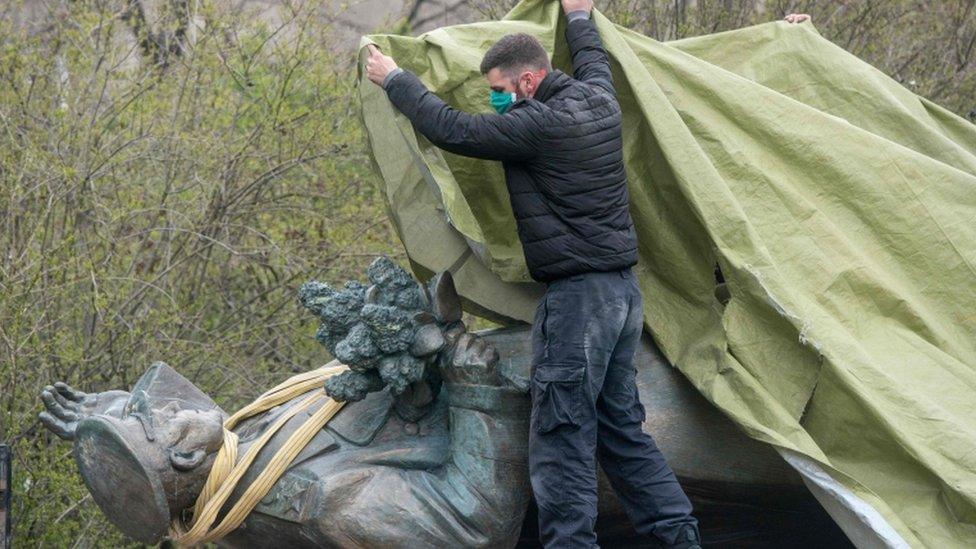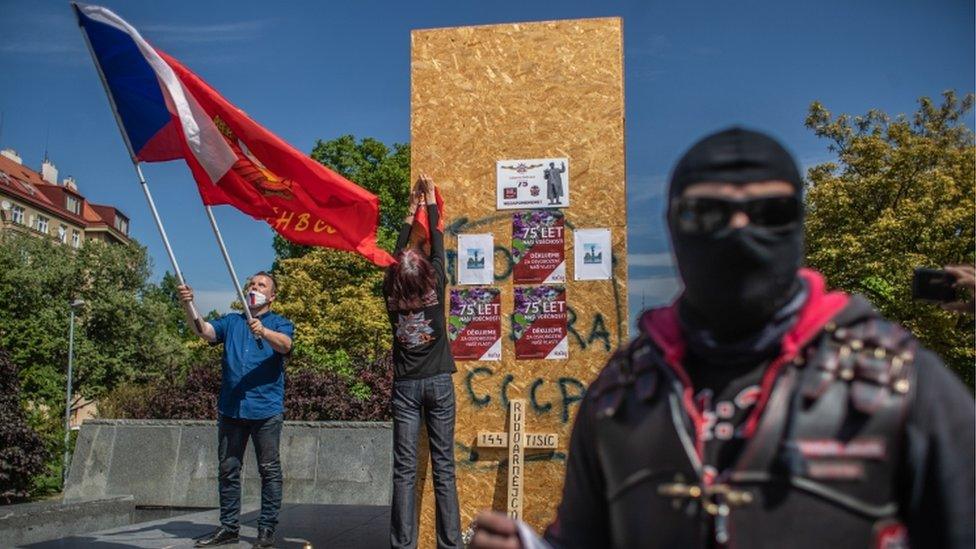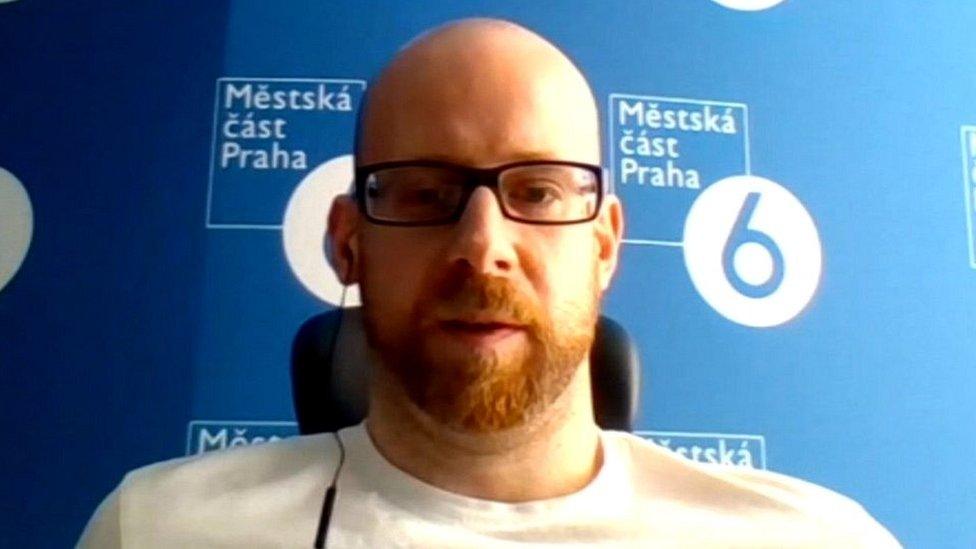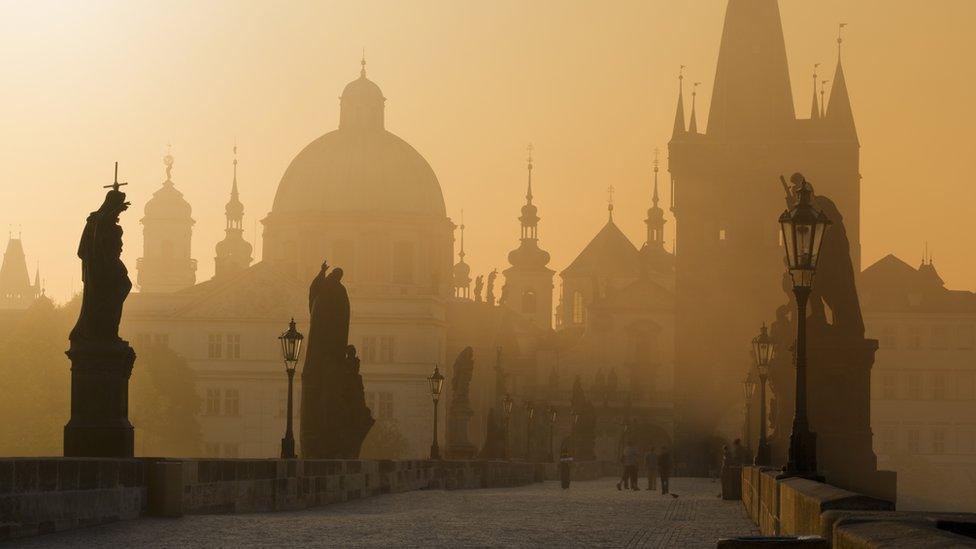Czech media name Russian diplomat in 'poison plot' row
- Published

Russia was angered by the removal last month of a statue of Soviet Marshal Ivan Konev
Russia's embassy in Prague has asked for police protection for one of its diplomats, who has been named by Czech media amid allegations of a plot to poison Czech politicians.
It said "false and unfounded" allegations had been made against one of its employees and he was now receiving threats.
There has been no confirmation three Czech mayors were the focus of a plot.
But all three - including the Prague city mayor - had police protection.
Last month a Czech weekly, Respekt, alleged that a Russian agent had travelled to Prague with a suitcase containing the highly potent toxin, ricin. It suggested the poison might be used to target Czech politicians who had angered Russia.
Who is the man named in Czech media?
A Czech TV news programme has now alleged that the reports involved Andrei Konchakov, head of the Russian Centre for Science and Culture in Prague, and suggests he is an undeclared intelligence officer.
Without naming him, the embassy said on its Facebook page that a member of its staff was the target of an "anti-Russian information campaign" and that it had been forced to apply for police protection for him. It said the diplomat was the victim of a "slander campaign" whipped up by Czech media.
Mr Konchakov told Czech website Seznam Zpravy he had brought "disinfectant and sweets" into the country in his suitcase, and not ricin as had been claimed.
Several Russian media have also reported his name. According to his biography on the Prague Russian centre's website, he was born in 1986 and given his current job in December 2017.
The head of the federal agency he works for in Moscow dismissed the reports as a "pure provocation", linked to an ongoing row over the removal of a statue of Soviet Marshal Ivan Konev in Prague.
Prague and Moscow are due to start talks in the coming days to try to defuse growing tension in bilateral relations.

Who is Konchakov?
By Rob Cameron, BBC Prague correspondent
Is Andrei Konchakov's cover blown? Is he even an undercover agent?
Russia denies this which, even if he was, is understandable. That's the whole point of being an undeclared intelligence officer.
Czech authorities also won't comment. But they have in the past complained about the supersized Russian diplomatic delegation.

Mr Konchakov has posted pictures of the old site of the Konev statue on Facebook and visited it last month
In 2018, there were 121 Russian diplomats and support staff in Prague, with another 18 at the country's consulates in Brno and Karlovy Vary. It's one of the biggest Russian diplomatic missions in Europe.
Exactly how many are spies using diplomatic cover is known only to Moscow. Privately Czech officials believe it could be as high as 40%.
Czech journalists are now tweeting photos of Mr Konchakov from his Facebook account. One of the most recent shows him surrounded by members of Russia's Night Wolves motorcycle gang, in front of the statue of World War Two Russian general Ivan Konev in Prague.
That's the statue that has now been removed; the act that caused so much anger in Moscow.

Who are the three mayors?
One is Ondrej Kolar, mayor of Prague's sixth district who ordered the removal of the statue of Marshal Konev. He went into hiding as reports of the plot emerged and told the BBC that "Czech police and the secret service do have some intel that there might be a threat directly from the Russian side".
Ondrej Kolar speaking to the BBC from a secret location
Prague Mayor Zdenek Hrib backed the renaming of a square next to the Russian embassy after Boris Nemtsov, the opposition leader murdered near the Kremlin in 2015.
The third is another district mayor, Pavel Novotny, who has backed a memorial to the anti-Soviet "Russian Liberation Army". Historians say the RLA, a division of Soviet prisoners of war integrated into the German army, did more to liberate Prague than the Red Army, but Moscow sees them as fascist collaborators.
- Published3 May 2020

- Published23 December 2018
